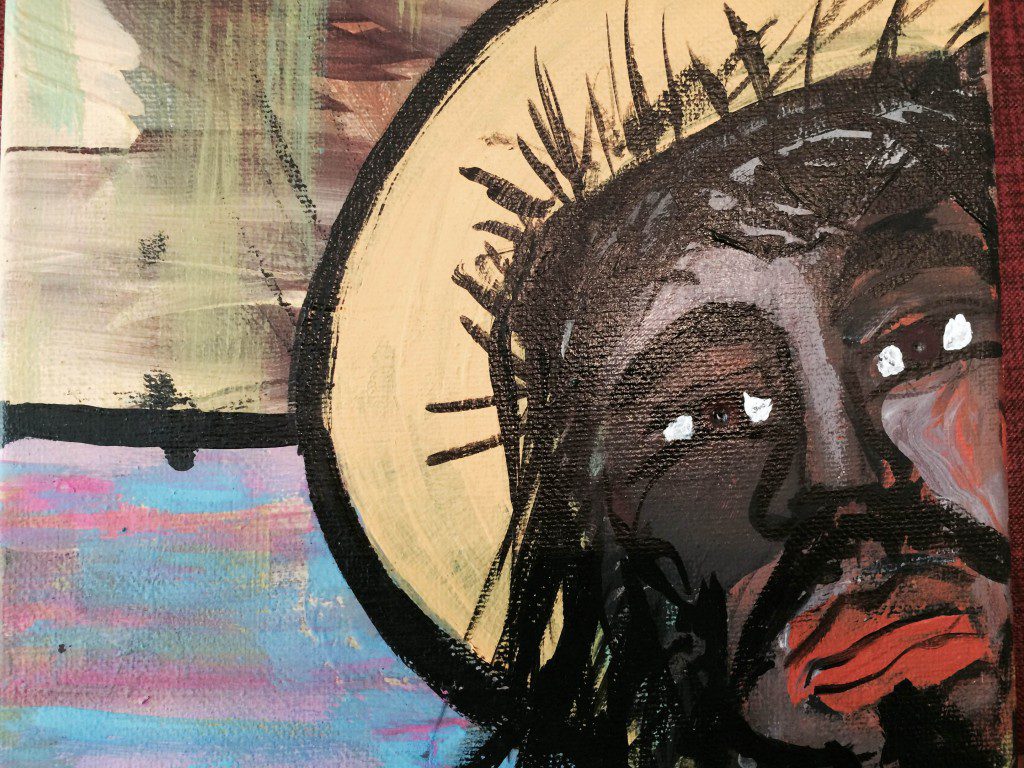
I’m going to be marching today with a group of immigrants whom some people call “illegal aliens.” The United Methodist Church just declared one of its bishops to be illegal. So I thought I would write about the way that Jesus is illegal. I don’t mean just in the sense that he broke the rules by healing on the Sabbath, eating and drinking with prostitutes and tax collectors, and engaging in property destruction in the Jerusalem temple courtyard. I mean that his cross puts him in the category of illegal humanity, that is people who are outside of respectable society by nature, people who don’t have the right papers or the right blood or the right genitalia.* The illegality of Jesus’ cross is essential to our salvation. It only works if we become illegal too by taking up our crosses to leave our respectability and follow Jesus.
James 4:4 says, “Friendship with the world is enmity with God.” I’ve done a lot of reflecting on that verse over the years. Growing up evangelical, I was very much taught to define myself against “the world.” The world was Hollywood and homosexuals and secular humanists. Because we evangelicals were not of the world, our task was to build gated communities where we could socialize and homeschool our kids away from the evolution and homosexuals and gangster thugs (black people) in the public school systems.
I can’t remember when the light bulb turned on and I realized that it was actually a bubble of rich white people renarrating their privilege as countercultural resistance. Maybe it was the fashion and the expensive haircuts of the homeschool moms. Maybe it was seeing family members give their lives to the stock market. Maybe it was the BMW’s and motorboats and Colorado ski trips and lake houses and beach houses. It wasn’t until much later that I was able to say actually white evangelicalism is completely worldly and “the world” that we define ourselves against is a ruse for protecting our worldliness.
I really think this is why the gay debate has never been a simple matter of scriptural discernment (which would allow for a range of interpretations like every other interpretive debate in the Bible). Resisting decadent worldly sexuality is the existential foundation of white evangelicalism. It’s the way that they can say they are taking up their crosses to follow Jesus. Without gay people as a worldly other to define themselves against, there’s little to distinguish white evangelicals from other selfish, respectable, perfectly nice and decent suburbanites. Would there even be a reason to go to church anymore or would they simply join the religion of travel soccer and Ivy League college admissions that drives the existence of all the other white suburbanites?
C.S. Lewis tells a parable about a kid “who wants to go on making mud pies in a slum because he cannot imagine what is meant by the offer of a holiday at the sea.” To me, that’s a perfect description of Christians who settle for a faux counterculturalism that masks their anxious worldly respectability. As long as respectability defines them, they will remain trapped in their million dollar mud pie slums. That’s not to say that we should be “revolutionary” in the self-absorbed, hipster form that predominates so much millennial culture. Revolutionary means nothing if it’s revolution for its own sake. Jesus invites us into is an existence outside of the safe but imprisoning boundaries of worldly respectability. The basic freedom that his cross gives us is the freedom to stop trying to justify ourselves. But all of this is for the greater purpose of solidarity with the billions of illegal people in our world.
People who live in the straightjacket of respectability have an existence of perpetual self-justification. They may do many kind and noble things, but it will always be an anxious performance until they are able to become illegal like Jesus. Of course, I should qualify what I mean by illegal, because I definitely don’t mean unjust. There are certainly plenty of people in the world who do selfish and harmful things that break the law. Jesus’ illegality is a very specific illegality: the illegality of love. The illegality of love means that you break the rules wherever there is a gap between the rules and true justice. It means that you walk over and stand next to whomever the world declares illegal and disposable whether it’s black transwomen, undocumented immigrants, rural poor white folks, Palestinians, or the billions of slum dwellers around the world who have nothing to offer our global economy and might as well die from the perspective of the market. It means that you become an accomplice in the affirmation of their humanity wherever that takes you.
When Jesus healed in the synagogue on the Sabbath, the ruler of the synagogue had a very good point: there were six other days of the week Jesus could have healed (Luke 13:14). None of the people he healed had a life-threatening condition that couldn’t have waited until the next day. But Jesus had to violate the propriety of the sacred worship space in order to teach that “the Sabbath is made for humanity not humanity for the Sabbath” (Mark 2:27), a principle which is still lost on Christians for whom holiness and respectability are synonymous. He had to destroy respectability in order to give dignity to afflicted people who had been the object of others’ shame because their afflictions were deemed to be God’s judgment against them.
Today is May Day, a day that has been used internationally to honor labor organizers who were thrown in jail and killed in their fight for working conditions that we take for granted today like the forty hour, five day workweek. In other words, it’s a great day to take up your cross and march with Jesus and the rest of those whom the world has always called illegal.
* I am completely indebted to Giorgio Agamben’s Homo Sacer for the concept of “illegal humanity” as well as Jon Sobrino’s notion of the “pueblo crucificado.”
Check out my book How Jesus Saves the World From Us!
Subscribe to our podcast Crackers and Grape Juice!
Support our campus ministry NOLA Wesley as a patron or one-time donor!












